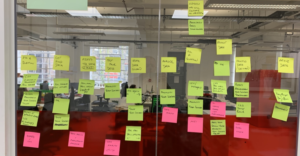What we’ve learned from implementing a data champions initiative
Guest post by Dirk Slater, FabRiders – a strategic social change consultancy
Establishing a network of individuals using data to improve the impact of grantmaking.
Introduction
 Building on last March’s blog detailing efforts and learnings from creating a data champions network, this report reflects on concluding the pilot initiative and how 360Giving plans to integrate what it has learned into future activities.
Building on last March’s blog detailing efforts and learnings from creating a data champions network, this report reflects on concluding the pilot initiative and how 360Giving plans to integrate what it has learned into future activities.
The initiative supported 360Giving’s vision for UK grantmaking to be more informed, effective and strategic. It provided insights into the challenges for community foundations to use data to support decision making. It also offered a direct connection and feedback loop to users of 360Giving data and tools.
In the summer of 2017, 360Giving collaborated with UK Community Foundations (UKCF) in providing a Data Expedition workshop for community foundations’ staff. Due to the success of this, UKCF decided to support the journey their members had started by establishing a network of practice – a Data Champions initiative. This ran from September 2018 to June 2019. Dianne Jones, UKCF’s Head of Membership, provided oversight; Mor Rubinstein, 360Giving’s Product & Programmes Manager, provided guidance; and Dirk Slater, FabRiders, implemented it.
What happened
We began with 10 individuals who work in community foundations and had taken part in the 2017 Data Expedition and indicated they would like to continue learning about using data. In September 2018, we began by interviewing them to understand better what they would want from a Data Champions initiative.
During those interviews, we learned that most of our data champions had developed skills in utilising data ‘on the job’. They are first and foremost managers of grants, donors and programmes. They are aspirational about making data-informed decisions and have a clear understanding of when and how data should play a role. They are interested in learning from each other about the challenges they face in integrating data into their work and the steps they are taking to overcome them. They want to compare notes about external datasets, ways to get valuable data from grantees, and help donors understand how they can have the most impact.
We wanted to start with a face to face meeting, but scheduling became increasingly difficult. We pressed ahead with convening online discussions on “Using external datasets” & “Getting useful data from others”.
The first face to face meeting was held in February 2018 at UKCF’s offices. The topic was data workflows in community foundations. Because of the healthy, robust and dynamic exchange that occurred at the workshop, we could see how much the participants valued time focusing on each other.
We also used this workshop to launch a knowledge sharing asset for the network, called the Data Champions Resource Library. We saw how the participants in the Data Champions initiative were relying on each other, their eagerness to compare notes and experiences. The resource library was developed to help support that engagement.
After the first workshop, we began to focus the online discussions on the champions themselves, letting them take the lead in discussing challenges and lessons learned in their use of data. Topics covered were: data sharing, harmonising qualitative and quantitative data, using GIS, and grantmaking analysis.
We held the second face to face workshop in April on building a data culture in community foundations. During this workshop, participants talked about being more intentional about surfacing existing learning opportunities, and ways to engage their colleagues on defining problems they want to solve with data.
A final online discussion took place in June 2019 and focused on how to drive the use of dashboards using tools like Power BI.
Reflections on the initiative
Once we had concluded the programme, we interviewed some of the participants to learn how they benefitted and how we might build on future efforts.
They highlighted that the initiative had allowed them to learn new ways to understand need and deprivation within their areas and the impact and effectiveness of their grantmaking. Things that they particularly liked about the initiative:
- The opportunity for informal conversations about the challenges they faced
- Not being tool-centric and focusing on why
- Being challenged to think differently about approaches to using data
- Framing data use around problems and questions, rather than the data itself
- The face to face meetings and the online discussions centred on their work and challenges
How 360Giving plans to carry the initiative forward
360Giving learned from the participants what it means to be a Data Champion in practice. It is not about an individual gaining a certification or a level of expertise. It is about aspiring for their foundation to embed the use of data and to be able to make data-informed decisions. It is also about establishing a ‘data culture’ – a learning culture – where data is identified to answer questions.
We also learned from participants that there is an enormous benefit in convening space for peer-learning amongst individuals who are advocating for their foundations to use data more. They learned from each other how to enhance abilities within foundations to understand need and deprivation within the communities they serve and increase the impact and effectiveness of their grantmaking.
We’re going to do more of this, with a broader data champions programme starting in autumn 2019. Join us on 9th October to find out what’s involved and how you can apply. Express interest via this form.
